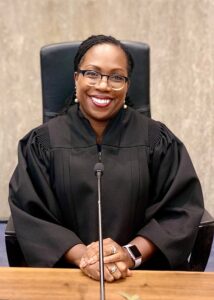On April 7th, 2022, the United States Senate voted to confirm Ketanji Brown Jackson to the Supreme Court. This historic vote marks the first time in its 232 year history that the Supreme Court of the United States (SCOTUS) will seat a Black woman.
Felling one of the greatest remaining barriers in the U.S. government, the confirmation of Jackson was not without controversy. Despite her thoroughly sufficient qualifications, Jackson received forty-seven “nays” from Senators, all from Republicans. In fact, only three Republican Senators — Sen. Susan Collins; Sen. Lisa Murkowski; and Sen. Mitt Romney — voted in favor of Jackson’s confirmation.
Political tension surrounding SCOTUS nominations has been growing for some time, and it was especially evident in Jackson’s confirmation. For example, Justice Neil Gorsuch was confirmed in 2017 with a vote of 54–45. In 2018, Justice Brett Kavanaugh was confirmed 50–48 (two Senators voted present). And, in 2020, Justice Amy Coney Barrett was confirmed in a vote of 52–48.
Fifty “yes” votes from the Senate are required to confirm a justice to the Supreme Court — so, essentially, the political party with control of the Senate decides the seats of SCOTUS.
Despite how deep-seated this political tension may seem, it was not always this way. Generally, past justices were confirmed with much more votes than they are today. Justice Ruth Bader Ginsburg, for example, was confirmed 96–3 even though she was a controversial figure for Republicans.
After Jackson’s nomination by President Joe Biden, Democrats had enough seats in the Senate to confirm the party’s justice nominee. The Democrats control 50 seats compared to Republicans’ 50, so if everyone voted along party lines, the tie-breaker would have fallen upon Kamala Harris, the Democrat Vice-President.
However, due to the votes cast by three Republican Senators who broke party lines, Harris never needed to break a tie, and Jackson was confirmed to SCOTUS in a single vote. The final votes tallied 53–47 in Jackson’s favor.
Jackson was nominated by President Biden to fill the seat of Justice Breyer, a liberal justice who has served on SCOTUS since 1994. In January, Breyer announced his decision to retire at the end of the current Supreme Court session. Jackson will join the Court upon Breyer’s retirement in the early summer. This treatment is uncommon for Supreme Court justices. Usually, confirmed justices join the Court shortly after being selected. But, because Jackson was nominated and confirmed far in advance of Breyer’s retirement, she will wait until June or July to join SCOTUS.

photo courtesy of Wikimedia Commons
Jackson’s rise to become the 116th justice named to the Court — and the first Black woman — has trained her for the integrity that the position demands.
Jackson’s connection to law can be traced back to her father, who switched careers late in life and enrolled in law school. He eventually became the Chief Attorney of Miami-Dade County in Florida. Jackson’s mother also served the public as a school principal.
Jackson attended Harvard University for both undergrad and law school. She was an editor of the Harvard Law Review, and she is currently a member of the Harvard Board of Overseers. After receiving education, Jackson held three clerkships, including serving as a clerk for Justice Breyer in 2000. She then worked briefly in the private sphere and then as a federal public defender from 2005 to 2007. From 2010 to 2014 she was the vice chair of the United States Sentencing Commission.
In 2012, President Barack Obama nominated Jackson to the Federal District Court in Washington, D.C. Because of this court’s importance, President Obama’s decision elevated Jackson to a new level of prestige.
President Biden nominated Jackson to yet a higher court in 2021 — the Court of Appeals for the District of Columbia Circuit, considered the nation’s second-highest court. This nomination was highly contested. During her hearings, Republicans hunted for anything in Jackson’s past that they could use to smudge her image. They found nothing, though, and Jackson was confirmed.
Fulfilling a campaign pledge to seat the first Black woman on the Supreme Court and to select a highly capable and brilliantly qualified justice, Biden nominated Jackson to the Supreme Court on February 25th, 2022.
The hearings for Jackson’s nomination were scathing and brutally intense. A liberal judge with a well-known record, Jackson received praise from Democrats and few questions. But to Republicans, Jackson’s legal philosophy was absolutely contrary to their view of the Constitution, government and policy. Republicans claimed that her views on race, gender and LGBTQ issues would make her incapable of lawfully and indiscriminately fulfilling her duties as a justice.
Republicans’ main arguments against Jackson’s nomination were that she would be “soft on crime.” They pointed to her previous decisions as a justice and claimed that she was gentle with administering jail time to convicts, especially to child predators.
Democrats fought this “soft on crime” narrative by highlighting Jackson’s endorsements from police academies and her family’s commitment to upholding the law— many of her family members are police officers. Democrats also compared her decisions to various conservative judges who made roughly the same decisions and had the same record as Jackson, emphasizing that her position on crime is not extraordinary.
Attacks on Jackson’s character were entirely self-serving and unproductive. For example, Ted Cruz, a Republican Senator from Texas, held up a book titled “Antiracist Baby” and asked Jackson whether she thought that babies are racist. Cruz was alluding to Jackson’s work as a trustee at a private elementary school which teaches “Antiracist Baby” in its curriculum. Jackson, ever composed, responded calmly: “I have not reviewed any of those books. They don’t come up in my work as a judge, which I’m respectfully here to address.”
Republicans made large, sweeping arguments against Jackson’s moral character, which had absolutely no relation to her nomination to the Supreme Court. One Republican Senator from Tennessee, Marsha Blackburn, repeatedly grilled Jackson on her opinion on trans people competing in athletics.
“Just last week,” started Blackburn, “an entire generation of young girls watched as our taxpayer-funded institutions permitted a biological man to compete and beat a biological woman in the NCAA swimming championships. What message do you think this sends to girls?”
This question, clearly, had nothing to do with Jackson or the law. Regardless, Jackson responded. “Senator, I’m not sure what message that sends. If you’re asking me about the legal issues, those are topics that are being hotly-discussed and could come to the (Supreme) Court.”
Jackson knew that her hearings should only concern her legal qualifications. But, Republicans hijacked her hearings and used them as a soapbox to denounce ideas like critical race theory and gender expansiveness.
Nothing would stop Democrats from confirming Jackson, though. Even a stroke affecting a Democrat Senator, Sen. Ben Ray Luján, days before the vote was not enough to deter her confirmation.
After the vote was finalized, Democrats were overjoyed by Jackson’s confirmation and having made history. Republicans disappointedly walked out. Notably, the only Republican Senator who stayed in the chamber to clap for the Supreme Court’s new justice was Sen. Mitt Romney.
Compared to all other Supreme Court justices that broke gender- or race-based barriers, Jackson’s vote was highly contested. Thurgood Marshall, the first Black justice, was confirmed in a vote of 69–11 in 1967. Sandra Day O’Connor, the first female justice, was confirmed 99–0 in 1981. The closeness of Jackson’s confirmation illuminates the current state of political divisiveness and hostility in the U.S.
On April 8th, the White House held a congratulations ceremony for Jackson on the South Lawn. There, Jackson spoke to the country about her ascension to the Supreme Court.
“In my family it took just one generation to go from segregation to the Supreme Court of the United States,” she said to thundering applause.
Progress was a repeated theme in Jackson’s speech. She highlighted both the progress that her family has made, succeeding against racism, and the progress that Black people across the country have made. She also thanked a number of key role models and trail blazers. Jackson’s confirmation to the Supreme Court represents another step of progress for Black Americans. 115 Supreme Court Justices were selected before one Black woman.
Jackson hopes that her presence at the highest court in the land will motivate young girls of color to follow in her footsteps.
In a powerful line, Jackson, quoting poet Maya Angelou, said, “I am the dream and the hope of the slave.” With this message, Jackson tells of the massive progress that she represents, but also reminds all that slavery and racism made positions of power historically unavailable for Black people.
With her voice at the table, Jackson will work towards empowering Black people and other disenfranchised groups. Following Justice Breyer’s retirement in early summer, Jackson will officially become a justice on the Supreme Court and will serve for decades to come.
Senator Cory Booker, a Democrat representing New Jersey, was elated at Jackson’s confirmation. “Like many Americans, I feel immense pride and so much joy at this historic occasion,” said Booker. “I am overjoyed to cast my vote in favor of a brilliant jurist who will inspire generations to come.”






